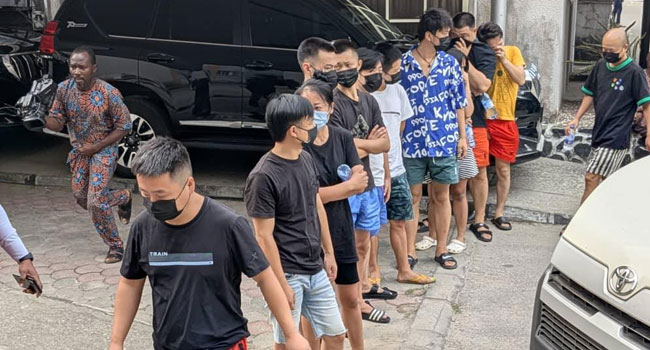The Economic and Financial Crimes Commission (EFCC) has initiated legal proceedings against 13 Chinese nationals and a company, Genting International Co. Limited, at the Federal High Court in Lagos over allegations of cybercrime-related
offenses. This marks a significant step following the agency’s high-profile crackdown on cryptocurrency investment fraud and romance scams, which led to the arrest of 193 foreigners and 599 Nigerians in late 2024.
During Friday’s court session, the EFCC’s legal team, led by Director of Legal Affairs, Larry Peters Aso, alongside Bilkisu Buhari-Bala and two others, formally charged the defendants before Justice Deinde Dipeolu.
The charges, drawn from Sections 18 and 27 of the Cybercrimes (Prohibition, Prevention, Etc.) Act, 2015 (as amended in 2024), were read to the accused in Mandarin with the assistance of an interpreter.
Among those arraigned were:
– Wanq Jia Qi (alias Xiao Tian)
– Wang Zheng Ming
– Liyin Hui
– Xiao Hong Will
– Zhang Xiuo Lei
– Ling Yang (alias Long Shao Ming)
– Guo Xiao Fei
– Yang Sheng
– Wang Zheng Feng (alias Feng)
– Chen Wenyuan
– Liu Sau Hua
– Luo Jia You (alias You)
– Rheign Dela Vega (alias Rheignal)
The EFCC accused the defendants of illegally accessing computer systems with the intent to disrupt Nigeria’s constitutional framework and engaging in identity theft by recruiting Nigerian youths to pose as foreign nationals for
financial fraud.
All 13 defendants pleaded not guilty to the charges. However, Wang Zheng Ming refused to accept the EFCC-appointed lawyer, requesting additional time to secure his own legal representation.
Following the plea, Justice Dipeolu adjourned the trial to February 3, 7, 14, and 21, 2025. The judge ordered that the defendants be remanded in the Nigeria Correctional Centre until their bail applications are heard.
The EFCC’s crackdown on December 16, 2024, led to the mass arrest of 792 suspects, including 148 Chinese nationals, 40 Filipinos, two Kharzartans, one Pakistani, and one Indonesian. The operation, conducted at the Big Leaf Building on
No. 7, Oyin Jolayemi Street, Victoria Island, Lagos, was based on months of intelligence gathering and surveillance.
According to EFCC’s Director of Public Affairs, Wilson Uwujaren, the foreign syndicate allegedly used the facility as a training hub for Nigerian recruits, coaching them on how to conduct romance scams and fraudulent investment schemes
while using stolen Nigerian identities.
Uwujaren emphasized that the case debunks the perception that cyber fraud in Nigeria is solely perpetrated by Nigerians, stating:
> “Foreigners are exploiting our country’s reputation to establish fraudulent operations here. However, as this operation demonstrates, Nigeria will not serve as a safe haven for criminals.”
With more foreign suspects expected to face trial soon, the EFCC remains steadfast in its commitment to dismantling cybercrime networks operating within the country.




